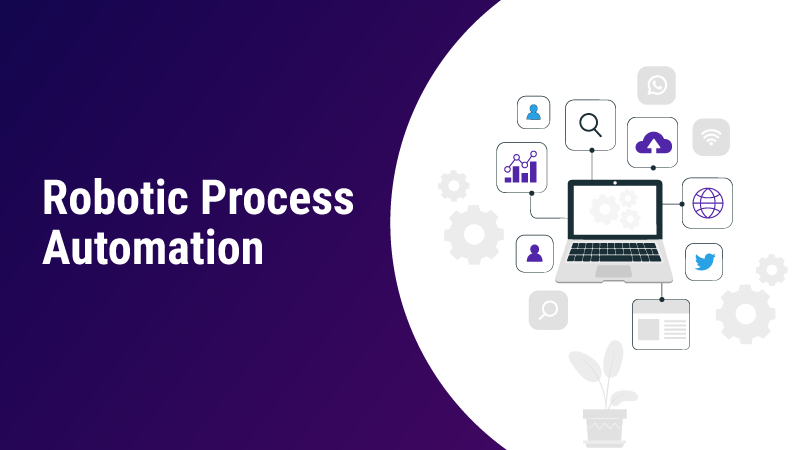RPA Use Cases in Telecommunication Industry

The telecom industry continues to grow, and the 5G promise is a crucial step in transforming the world. Strong networks and continuity of services without interferences are significant to them. Telecom industries are moving towards RPA to fulfill the upcoming tasks in the telecom industry, eliminate costs, improve customer service, increase performance and enhance data quality.
There are a large number of tedious, manual, and rule-based business processes in the telecom industry, including service completion, billing, revenue management, and more. The automation of these tasks can save hours of manual labor. RPA provides the telecom industry with the flexibility and dexterity needed to rise and meet the challenges along its path. In a world where telecom companies are competing with each other to offer the quickest and most affordable services to their clients, RPA is needed for fast growth and large-scale functional processes such as data management, cost control, business acumen, skills acquisition, and development of new services.
Let us talk more about RPA and its relation with the telecommunication industry.
Use Cases of RPA in the Telecommunication industry
The Telecom industry is one of the industries that make use of RPA at a higher level. Below given are some of the major use cases of RPA in the telecom industry.
Customer onboarding and offboarding
Telecom industries can keep a clear view of their customers and details related to them with the help of automation in the onboarding and off-boarding process. With Robotic Process Automation, it is quite easy to automatically onboard a newly joined and to pick them out easily when they leave. This allows the industry to save time, cost, minimize errors and enable the employees to work on more attractive and high-value tasks.
Network management
Capacity requirements are one of the most challenging areas for telecom providers to deal with as rich content is continuously being exchanged between applications, instruments, and users. As the level of traffic and complications in the distributed networks increase, telecom network management is becoming difficult for service providers because it involves navigating complex applications, manually retrieving data, and large amounts of customer-related information retrieval to enhance the efficacy of the network infrastructure. Deployment of RPA technology enables telecom providers to make use of automated solutions for monotonous tasks such as event and diagnostic management, thus allowing network engineers to give more attention to complex processes.
Billing
The RPA tools are capable of automating the billing process, thus helping in maintaining customer billing records, invoicing, and coordination across its myriad channels and departments. This allows industries to carry out the tasks on time without making any mistakes.
Debt collection
Automation of the back-office operations of debt collection will depend on the efficacy of RPA application in the telecom industry. RPA also allows telecom companies to recognize and gather what they owe to their firm on their due dates. Different stages of the debt collection process including updates regarding payment details, chases, due dates, and payment reconciliation can be automated using a powerful and efficient RPA tool. This way it allows employees to become productive without having to worry too much about the collection and more concerned about the distribution of services.
Improve average user revenue
It is very important to keep an eye on the average user revenue/revenue per user as it is one of the major Key Performance Indicators (KPIs) in the telecom industry. Telecom companies will be able to recognize sales opportunities by assessing customer data and the eligibility of the customer for multiple sales campaigns using Robotic Process Automation technology even on an ongoing call, which increases closing rates and the average size of the deals.
Benefits of RPA in Telecom
Robotic process automation has many advantages that enable the industry to meet its challenges and make their task easier. Here is the list of benefits of using RPA in the telecom industry.
Scalability
Depending on the needs, the RPA bots can be easily lowered and enlarged. They make changes easily. The workflow generated using RPA for the automation process can be used again and replicated exactly across different business sectors and locations. With RPA scalability can be attained very easily and speedily.
Cost-saving
RPA deployment costs less than any other business process management software. The software license can be used for multiple processes; thus, it minimizes costs and increases investment returns. RPA can even reduce the cost of processing by around 80%.
Data flow
The software bots easily emulate human actions like mouse clicks, keystrokes, and communicate with the interface. RPA, therefore, eliminates the gap between data sources and makes the data easier to access. Since RPA is non-aggressive in nature, it is easy to implement in prevailing work.
Productivity and speed
Robotic Process Automation performs all the mundane and non-strategic tasks, hence releasing the manual laborers from such tasks so that they can fully focus on tasks that actually require human creativity and intelligence. In addition, RPA bots can complete tasks quickly and accurately when compared to human workers and take very little time.
Customer satisfaction
Since RPA can automate back-office processes, employees can give more attention to client requirements instead of concentrating more on time-consuming back-office tasks.
Better accuracy
RPA bots are trained in a way to performs tasks accurately with no errors. Unlike human workers who get tired and make mistakes, RPA bots are very stable and accurate.
Wrap Up
The implementation of Robotic Process Automation Solutions in telecom is the best approach to tackle various challenges and problems that hinder the development of telecom companies. The flexible and easy deployment of RPA bots facilitates telecom providers to automate advanced operations. This essentially indicates RPA can automate almost every back-office operation and partially automate processes involving human intervention or reasoning.
Overall, RPA seems to be a perfect tool for the telecommunications industry as it grows and expands globally. In the fore coming years, the use cases of RPA in the telecommunications industry will increase exponentially, creating various opportunities for similar technologies to build the necessary automation frameworks.
Get Started with our RPA ServicesRead more about RPA
One thought on “RPA Use Cases in Telecommunication Industry”
Leave a Reply
Blogs by Category
AppForms Artificial Intelligence Blockchain Call Centers Chatbots Cloud Computing Data Management Design Digital Marketing Digital Transformation Enterprise Applications FinTech Insights LowCode Development Microsoft Mobile Apps News Office 365 Robotic Process Automation Security SharePoint Software Development Web ApplicationWhat is Robotic Process Automation? RPA Explained

2024-05-23 16:56:57
Amazing piece of information, Aaravind; really appreciate the information received.